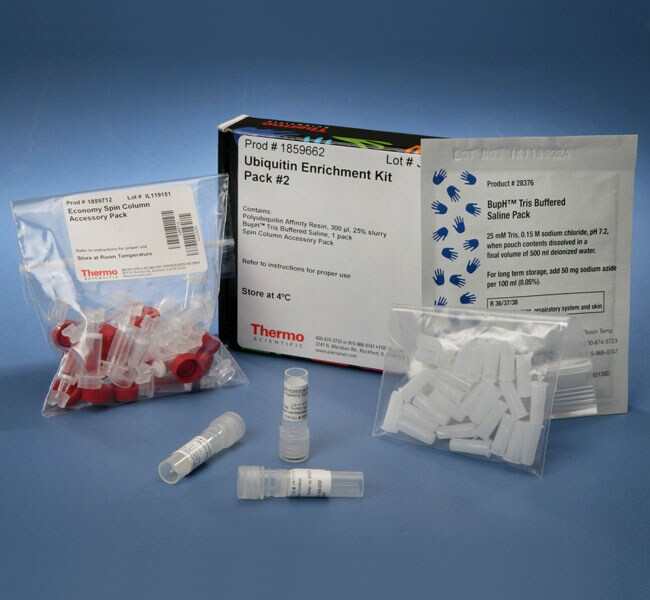
The Thermo Scientific Pierce Ubiquitin Enrichment Kit facilitates the isolation of polyubiquitin protein conjugates from cultured cells and tissue samples.
Features of the Ubiquitin Enrichment Kit:
• Fast—less than 45 minutes hands-on time for binding and recovery of ubiquitinated proteins
• Complete—includes all reagents needed for ubiquitin-modified protein enrichment from cultured cells and tissue samples
• Flexible—sample incubation from 2 hours to overnight allows assay to be completed in several hours or in less than 30 minutes after overnight incubation
• Robust—compatible with all Thermo Scientific Pierce Cell Lysis Products and standard RIPA formulations
• Multiple-sample format—easily processes 1 to 15 samples concurrently
The fractions recovered from the Pierce Ubiquitin Enrichment Kit can be subsequently analyzed to determine the amount of general ubiquitin conjugates present or to identify a specific protein of interest by Western blotting. The assay protocol is fast and straightforward, allowing for isolation of polyubiquitinated proteins and the fractionation of monoubiquitinated species in the resin flow-through. The kit provides exceptional performance as demonstrated by enriching an epoxomicin-treated HeLa lysate for poly ubiquitinated proteins. The Ubiquitin Enrichment Kit outperforms similar resins from other suppliers and provides a clean and specific preparation of proteins when compared to a control resin.
The ubiquitin-proteasome pathway is the principal non-lysosomal pathway that controls the proteolysis of proteins. This pathway is significantly involved in a variety of cellular processes, including DNA repair, transcriptional regulation, signal transduction, cell metabolism and morphogenesis. The ubiquitination process is initiated when ubiquitin, an 8 kDa polypeptide consisting of 76 amino acids, is appended to cellular proteins via the C-terminal glycine of the ubiquitin molecule. Following an initial monoubiquitination event, the formation of a ubiquitin polymer may occur. Polyubiquitinated proteins are then recognized by the 26S proteasome that catalyzes the degradation of the ubiquitinated protein and the recycling of ubiquitin. Differences in total ubiquitination or the ubiquitination of specific proteins affect numerous pathological conditions, including malignancies, certain genetic diseases and neurodegenerative diseases.¹
| Code | Description |
|---|---|
| 89899 | Catalog Number: 89899 |

